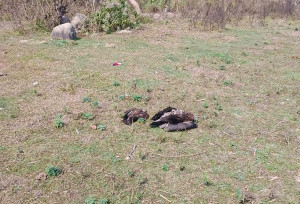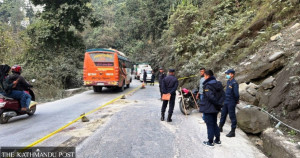Around a 100 security personnel are patrolling the India-Nepal border in Nawalparasi (West) to prevent people from crossing the frontier after six individuals tested positive for Covid-19 in the neighbouring Maharajganj district in India.
On Monday, the District Security Committee decided to step up patrol around Maheshpur customs, Jhulanipur border crossing and other small border points to halt the movement of people.
Nawalparasi (West) shares a 28 km-long border with Maharajganj. However, there are only four Armed Police Force posts to guard the entire stretch.
Superintendent of Police Bharat Khaniya, head of Battalion No. 26 of the Armed Police Force, said temporary posts have been setup along the border to monitor the movement of people in the area following complaints that people were entering into the country by swimming in the Narayani.
According to Khaniya, security personnel patrol the area around the clock these days.
“We have set-up 35 makeshift camps to patrol the border,” said Khaniya.
“Locals had asked us to deploy more security personnel at the border since movement across smaller border points were going unchecked.”
Shiva Narayan Chaudhary, a local of Palhinandan, said people are still ferrying vegetables, food grains and other essentials from India at night. “Some of them say they have come to visit their in-laws; some carry daily essentials in bicycles or motorcycles at night,” said Chaudhary. “The lockdown isn’t very effective in this area and people are still moving freely across the border.”
Sagar KC, information officer at the District Administration Office, said that authorities have directed security personnel deployed at the border points to talk to people about the importance of staying put. “People are still crossing the border like they would before the pandemic took its current shape,” he said. “That’s why we had to increase surveillance here.”
Frequently asked questions about the coronavirus outbreak
UPDATED as of September 22, 2020
What is Covid-19?
Covid-19, short for coronavirus disease, is an illness caused by the coronavirus SARS-CoV-2, short for severe acute respiratory syndrome coronavirus 2. Common symptoms of the disease include fever, dry cough, fatigue, shortness of breath and breathing difficulties. In severe cases, the infection can cause pneumonia, severe acute respiratory syndrome, kidney failure and even death.
How contagious is Covid-19?
Covid-19 can spread easily from person to person, especially in enclosed spaces. The virus can travel through the air in respiratory droplets produced when a sick person breathes, talks, coughs or sneezes. As the virus can also survive on plastic and steel surfaces for up to 72 hours and on cardboard for up to 24 hours, any contact with such surfaces can also spread the virus. Symptoms take between two to 14 days to appear, during which time the carrier is believed to be contagious.
Where did the virus come from?
The virus was first identified in Wuhan, China in late December. The coronavirus is a large family of viruses that is responsible for everything from the common cold to Middle East Respiratory Syndrome (MERS) and Severe Acute Respiratory Syndrome (SARS). After an initial outbreak in Wuhan that spread across Hubei province, eventually infecting over 80,000 and killing more than 3,000, new infection rates in mainland China have dropped. However, the disease has since spread across the world at an alarming rate.
What is the current status of Covid-19?
The World Health Organisation has called the ongoing outbreak a “pandemic” and urged countries across the world to take precautionary measures. Covid-19 has spread to 213 countries and territories around the world and infected more than 31,405,983 people with 967,505 deaths and 22,990,260 recoveries. In South Asia, India has reported the highest number of infections at 5,557,573 with 88,943 deaths. While Pakistan has reported 306,304 confirmed cases with 6,420 deaths. Nepal has so far reported 65,276 cases with 427 deaths.
How dangerous is the disease?
The mortality rate for Covid-19 is estimated to be 3.6 percent, but new studies have put the rate slightly higher at 5.7 percent. Although Covid-19 is not too dangerous to young healthy people, older individuals and those with immune-compromised systems are at greater risk of death. People with chronic medical conditions like heart disease, diabetes and lung disease, or those who’ve recently undergone serious medical procedures, are also at risk.
How do I keep myself safe?
The WHO advises that the most important thing you can do is wash your hands frequently with soap and water for at least 20 seconds or use hand sanitizers with at least 60 percent alcohol content. Avoid touching your eyes, nose and mouth with unclean hands. Clean and disinfect frequently used surfaces like your computers and phones. Avoid large crowds of people. Seek medical attention if symptoms persist for longer than a few days.
Is it time to panic?
No. The government has imposed a lockdown to limit the spread of the virus. There is no need to begin stockpiling food, cooking gas or hand sanitizers. However, it is always prudent to take sensible precautions like the ones identified above.





 8.22°C Kathmandu
8.22°C Kathmandu















